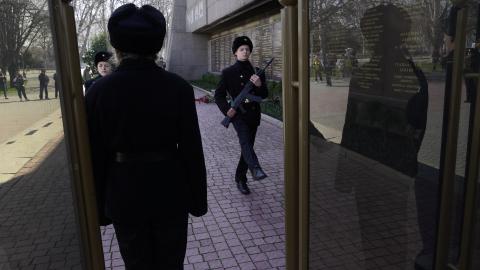It has been an eventful week for Russian forces in Crimea. There were explosions near the town of Dzhankoi, an important railway junction used by the Russian military. Ukrainian suicide drones were said to have attacked a train transporting cruise missiles to Russia’s Black Sea Fleet. For the second time in the war, Ukraine also launched a naval drone attack against Russian warships in Sevastopol.
The Crimean Peninsula, recognized internationally as part of Ukraine but annexed and under Russiancontrol since 2014, was originally thought by Moscow to be a safe distance away from Ukrainian strikes. This optimism is turning out be misplaced. There has been a series of attacks against targets across the peninsula, including military airfields, naval bases, and headquarters. The most high-profile attack took place last October, when the Kerch Bridge was hit the day after Vladimir Putin’s 70th birthday. This bridge is the only physical link between the Crimean Peninsula and the Russian Federation.
In military parlance Crimea is “decisive terrain” — in layman’s terms, any area that gives one side a military advantage over the other in a conflict. On the tactical level, this could be a hilltop. On the strategic level, itcould be a large area of land such as the Crimean Peninsula. This is why both sides consider Crimea to be so important.
Some argue that Crimea has a complicated history that makes it difficult to determine its legal status. In fact,it’s straightforward. Crimea belongs to Ukraine, and even Russia recently believed this to be the case too. In December 1991, during the collapse of the Soviet Union, the first country in the world to recognize Ukraine’s independence and national borders to include Crimea was Russia. By early 1992, most countries followed Russia’s lead and recognized Ukraine’s independence and control over Crimea.
The first Gulf state to recognize Ukraine’s independence was the UAE in January 1992. In 2014, when Russia made moves on Crimea, a majority of countries in the UN General Assembly voted in support of Ukraine. At this time, no Gulf state voted against the resolution condemning Russia’s annexation of Crimea. Last month, when the UN General Assembly voted on a resolution calling for Russia to withdraw its forces from Ukraine, 141 countries, including every member of the GCC, voted in favor.
The outcome of the most recent UN General Assembly vote should not be a surprise. Even countries thousands of kilometers away from Crimea can be impacted by events there. Russia has traditionally used Crimea as a springboard for its geopolitical goals in the broader region. Before the war in Ukraine began last year, Russia used its naval bases in Crimea to support its operations in the eastern Mediterranean and in support of Bashar Assad in Syria. Russia has also used its assets in Crimea to exert influence in Libya.
Also, for as long as Russia maintains a military presence in Crimea, it can disrupt vital grain exports from Ukraine to the rest of the world. Thankfully, the deal brokered by Turkiye between Moscow and Kyiv last year allowing Ukrainian grain to be exported has been renewed. However, Russia has the ability to turn this deal on or off as it wishes, because its presence in Crimea gives it a dominant military position in the Black Sea.
As Ukrainians advance on the battlefield the military contest for Crimea becomes more of a reality. It is likely that the location of Ukraine’s main counterattack this year will be in the south, from Zaporizhzhia in the direction of Melitopol. If Ukrainians reach the Sea of Azov and cut the land bridge connecting the Russian Federation with Crimea, the next item on Ukraine’s agenda will be entering the peninsula itself. Russia is fully aware of this; satellite imagery shows new anti-tank obstacles and fortified trenches being constructed across Crimea.
The Russians will not give up Crimea without a fight, but the Ukrainians are determined to take it back. Any settlement to the war that does not bring Crimea back under Kyiv’s control sets a dangerous precedent. The last time a country used military force to annex the territory of another was when Saddam Hussein invaded Kuwait in 1990 to make it Iraq’s 19th province. Another good comparison of Russia’s occupation of Crimea is Iran’s control over the three UAE islands of Abu Musa and the Greater and Lesser Tunbs, and the presence there of the Revolutionary Guards navy.
For as long as Russia maintains a military presence on Crimea, Ukraine will never be fully safe. There will always be the possibility of renewed fighting. This is why any end to the conflict, whether militarily or diplomatically, must result in Crimea being returned to Ukraine.















